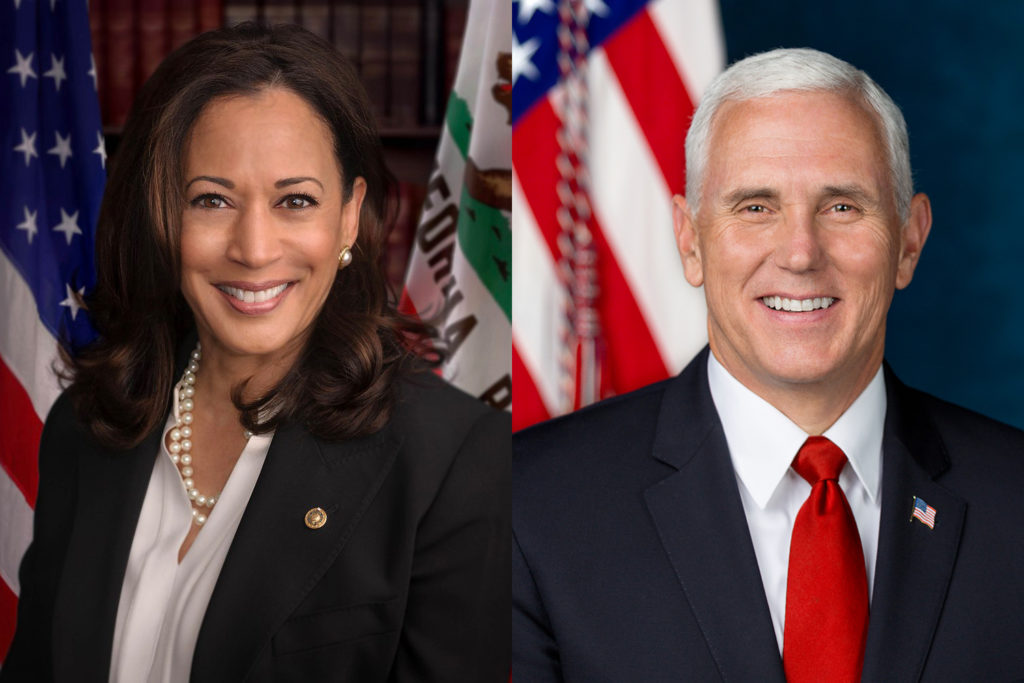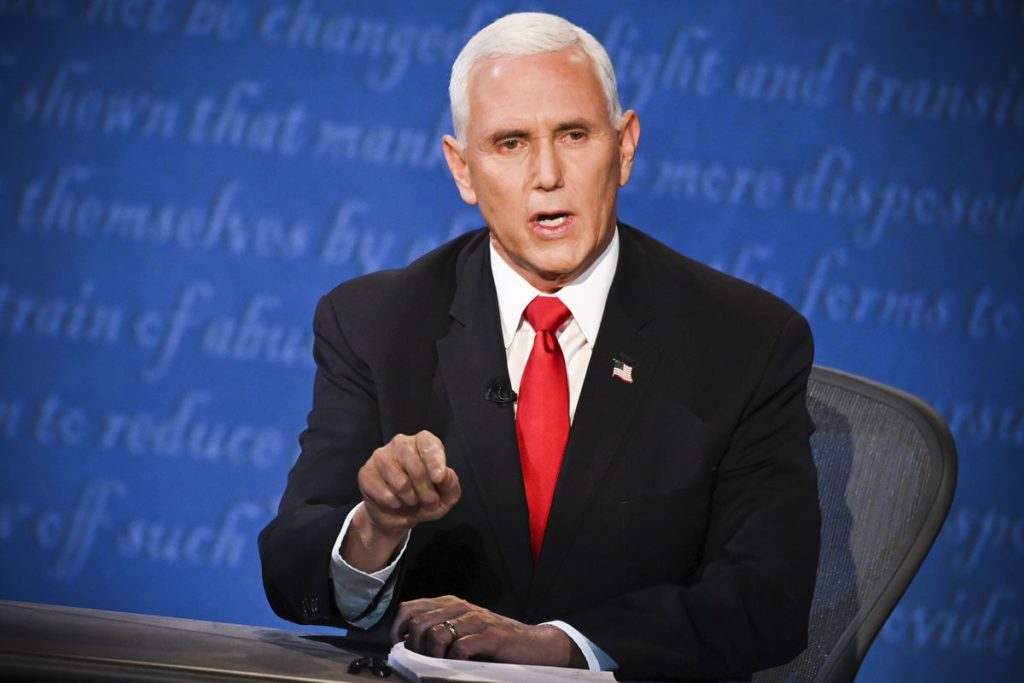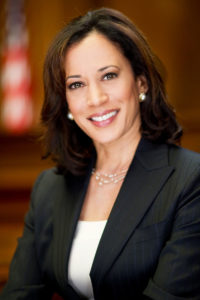She called Trump’s handling of the pandemic “the greatest failure of any presidential administration in the history of our country” and alluded to his statement to author Bob Woodward that he wanted to play down its threat because he did not want to create a panic.

“I want to ask the American people, how calm were you when you were panicked about where you’re going to get your next roll of toilet paper?” she asked, looking directly into the cameras. “How calm were you when your kids were sent home from school and you didn’t know when they could go back?”
Pence focused on Biden’s plan to raise some taxes for the wealthy and his efforts to move past fossil fuels, repeatedly returning to mentions of the “Green New Deal.” He called Biden a “cheerleader for communist China” and attacked the former vice president for recommending that Obama delay the raid that killed al-Qaeda leader Osama bin Laden.
“On day one, Joe Biden is going to raise your taxes,” Pence said.
Seated at distant tables and separated by clear plexiglass barriers to help prevent infection, Pence, 61, and Harris, 55, had arrived in Salt Lake City as two of the most consequential running mates in recent history, adding an element of suspense to a debate that typically plays little role in an election result.
Trump, 74, is still undergoing treatment for a virus that kills about 1 in 20 people in his age group, and Biden, 77, has not committed to seeking a second term if he wins election next month.
Pence’s soft-spoken debate style was a marked contrast to the excitable and at times belligerent tone Trump took a week earlier in his debate with Biden. But like Trump, he repeatedly went over his allotted time and spoke over moderator Susan Page, ignoring her attempts to keep the debate moving by frequently saying, “Thank you, Mr. Vice President.”
From the opening minutes of their sole scheduled meeting, Harris was the more assertive of the two, accusing the Trump administration of misleading and failing the country, and calmly upbraiding Pence when he interrupted her. “Mr. Vice President, I am speaking,” she said. She, too, occasionally ran over the time limits.
Though Harris’s advisers said they hoped she would not end up fact-checking Pence, she did dedicate some time to doing so, contradicting Pence’s assertions that Biden would raise taxes — she repeatedly said nothing would change for those earning less than $400,000 — and ban fracking. Biden has proposed an end to new fracking on federal lands but does not support banning the practice altogether.
Neither candidate brought the brio and fire that defined the first presidential candidate debate, lapsing at many points into rehearsed talking points that have been featured in campaign advertising for months. Nor was there a major misstep or effort to trod new ground in a way likely to disrupt the race, which has remained remarkably stable, with slight variation, since the late summer.
Entering the debate, Pence allies hoped to make foreign policy a major part of the conversation, banking on their hope that Harris, with no executive experience on the federal level, would be weaker on the issue.
Pence’s guests at the debate included the family of aid worker Kayla Mueller, who was kidnapped and killed by the Islamic State in 2015, and he said the Obama administration had hesitated in implementing a plan that could have saved her life.
“Her family says, with a heart that broke the heart of every American, that if President Donald Trump had been president, they believe Kayla would be alive today,” Pence said.
Harris turned to the Mueller family and offered her condolences, but pivoted to Trump’s attitudes toward the armed forces. She pointed to Trump calling the traumatic brain injuries suffered by American soldiers in Iraq “headaches” and recalled Trump saying Sen. John McCain (R-Ariz.) wasn’t a hero because he had been captured by the enemy.
Pence responded by evoking his own family’s military service.
“President Donald Trump not only respects but reveres all those who serve in our armed forces,” Pence said. “And any suggestion otherwise is ridiculous.”
At another point, Pence declined to say that climate change was an “existential threat” when asked directly, after Harris had characterized it as that. “We will follow the science,” he said, although the administration has ignored scientific consensus on the cause of climate change.
The debate was held after a week of devastating viral spread in the political world, with at least 21 people connected to the White House or the Trump campaign testing positive for the coronavirus.
The disease has come perilously close to the current vice president, who attended various White House events with associates who have since tested positive, including a meeting with Trump in the Oval Office. The night before the vice-presidential debate, Pence’s communications director, Katie Miller, was forced to depart Salt Lake City, where she had participated in debate preparations on Tuesday, after her husband, White House speechwriter Stephen Miller, tested positive.
Pence has continued to test negative and has not quarantined after his personal physician concluded that his activities did not qualify as a “close contact” with an infected person under federal health guidelines.
The level of infection in Utah, where the debate was held, has been running at more than twice the national average, making both the state and the Salt Lake region areas of “code red” concern by the White House coronavirus task force, which Pence leads. The virus has killed more than 211,000 Americans and sickened more than 7.5 million.
The fate of the final two presidential debates, scheduled for Oct. 15 in Miami and Oct. 22 in Nashville remained contingent on Trump’s recovery and a negotiation over safety precautions, which was expected to begin later this week. Trump campaign adviser Jason Miller said Wednesday that Trump was already discussing the possibility of holding events over the weekend, or early next week, pending the approval of his doctors. Miller said Trump would be ready for the debate.
“I think if he still has covid-19, we shouldn’t have any debate,” Biden told reporters Tuesday. “I think we’re going to have to follow very strict guidelines.”
National and state polling averages maintained by The Washington Post show Biden and Harris had a clear advantage going into Wednesday’s debate. They lead Trump and Pence by a margin of 53 to 42 in national polls over the last month. In other averages, the Biden campaign has a three-point lead in Florida, a three-point lead in Arizona, a seven-point lead in Michigan, an eight-point lead in Pennsylvania and a seven-point lead in Wisconsin. Trump won all of those states in 2016.
Charged with reversing that positioning, Pence reprised his role as a point person for the Trump administration with conservative evangelical voters, describing himself as proudly antiabortion.
Yet for the second time on a 2020 debate stage, the Republican ticket punted on whether Amy Coney Barrett, the president’s Supreme Court nominee, would provide potentially the fifth vote to overturn Roe v. Wade.
In the presidential debate in Cleveland, Trump questioned what Biden meant when he said the 1973 abortion decision was “on the ballot,” and in Salt Lake City, Pence declined to say whether he would want his home state to ban abortion and instead criticized Harris for supporting taxpayer funding for the practice.
“For my part, I would never presume how Amy Coney Barrett would rule,” Pence said.
Pence took advantage of the decision by both Harris and Biden not to answer left-wing demands to “pack” the Supreme Court by adding liberal justices, pointing out that she would not rule it out.
“If you haven’t figured it out yet, the straight answer is they are going to pack the Supreme Court,” Pence said.
Harris did make a promise no candidate for president or vice president ever had on a debate stage. “We will decriminalize marijuana,” she said, adding that a Biden-Harris administration also would expunge the records of people convicted of marijuana-related offenses.
Some party strategists have urged the campaign to emphasize that position, touting its popularity with younger voters. In Arizona, which Harris and Biden will campaign in Thursday, a ballot measure that would legalize marijuana is leading in polls; two years ago, Utah voters passed a measure legalizing medical marijuana.
Harris also said she didn’t believe that Breonna Taylor, a Black woman killed in a raid in Kentucky earlier this year, had received justice with a recent grand jury decision minimizing charges against officers involved in her death. She offered support for those protesting in the name of racial equality.
Pence said “he trusts our justice system” and said there is “no excuse for rioting and looting.” He then told Harris he considers it an “insult” when Biden and Harris refer to systemic racism in the criminal justice system.
“Joe Biden and I recognize that implicit bias does exist, Mr. Vice President, contrary to what you might believe,” Harris said. “Again, I will not be lectured by the Vice President on our record.”
The racial and social tensions Harris talked about — and Pence accused her of misleading viewers on — were visible in the streets near the debate site.
Members of Utah Citizens’ Alarm, a group founded this summer to confront any violence at protests with a show of armed strength, joined pro-Trump voters along the motorcade route. Some members of the far-right Proud Boys, which has picked fights with protesters, were seen nearby, one telling reporters that they were “standing by.”
That was a reference to the message the president sent the group at the Cleveland debate, which they had quickly adopted as a slogan.
Source: The Washington Post





Comment here
You must be logged in to post a comment.